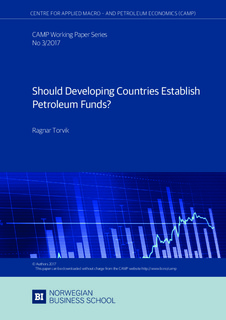| dc.description.abstract | Many natural-resource-abundant countries have established petroleum funds as part of their strategy to manage their resource wealth. This paper examines reasons that such funds may be established, discusses how these funds are organized, and draws some policy lessons. The paper then develops a theory of how petroleum funds may affect the economic and political equilibrium of an economy, and how this depends on the initial institutions. A challenge with petroleum funds is that they may produce economic and political incentives that undermine their potential benefits. An alternative to establishing petroleum funds is to use revenues to invest domestically in sectors such as infrastructure, education, and health. Such investments have the potential to produce a better economic, as well as institutional, development. This is particularly the case if the initial institutions are weak. | nb_NO |
